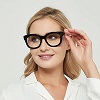Should I Wear Glasses While Using Phone
Smartphones have become so prevalent in Western society that almost every individual owns one within the last decade. The safety of using them all the time, however, remains a question, especially if they are used together with other eye-wear, such as reading glasses. In short, many people wonder whether it is safe to stare at a phone while wearing glasses.
While looking at the screen of a smartphone or tablet through glasses should not cause any problems, there are a few simple ways to determine whether you should reduce your screen time if you wear glasses.
Considering factors such as the effect of blue light on one’s eye-sight complicates the question of whether or not you should wear glasses when looking at your phone all of the time. For that reason, it might be best to monitor not only your amount of time spent on your phone, but also how it makes your eyes feel when you are looking at your phone. It is currently unclear whether blue light is bad for our eyes.
Common Eyesight Ailments – Hyperopia and Myopia
The most common form of eyewear used for correcting vision is eyeglasses. A variety of vision problems can be corrected with them, including nearsightedness or myopia (problems with seeing distant objects) and farsightedness or hyperopia (problems with seeing close up). Additionally, they are capable of correcting astigmatism, a condition in which the cornea is abnormally shaped and blurs the vision.
Consequently, light creates two focal points instead of one as a result of the distortion in the cornea’s shape. The contact lenses you wear will most likely need to be slightly different shaped if you have astigmatism and wear contacts as well. By using different shaped lenses to adjust how light is refracted to the eye, glasses work.
How Glasses Correct your Vision
There is always one end of a prism that is thicker than the other end of a lens, and light passing through the prism gets refracted, or bent, in the direction of the thicker end of the lens. Concave lenses are the thinnest near the center and are designed to correct nearsightedness. They are cut in a specific shape to bring images closer, farther away, or to correct other problems, such as double vision.
In contrast, convex lenses are thickest near the center, similar to magnifying glasses, and correct farsightedness (like reading glasses). Astigmatism is corrected with cylindrical lenses, which curve more in one direction than the other. You may have concave lenses in your glasses that are also cylindrical if you have difficulty seeing faraway objects and are astigmatic.
The question may arise for nearsighted individuals whether or not they need to wear their glasses in order to work on screens up close. Additionally, many may wonder whether wearing glasses for nearsightedness will negatively impact their vision.
It is common for us to spend a great deal of time looking at screens, whether it is scrolling through our smartphones, working on the computer, or relaxing and watching television. Those of us who already have imperfect vision, who wear glasses, may wonder whether or not it is a good idea to wear our glasses while viewing up-close screens.
Will the Close Screen Have an Effect?
Your nearsightedness may allow you to read or use a smartphone or computer screen without wearing your glasses. It is common for some individuals to only require mild corrections when driving or reading far away, such as when they are seated in the back of a classroom. Those individuals will not require their glasses to read close to a screen.
Nevertheless, some individuals require stronger corrections and are only able to read from a screen very close to their faces, causing severe eye strain. If this is the case for you, please do not strain your eyes. Wear your glasses at all times, even when viewing a close-up screen. It is fine to wear your glasses all the time unless you are experiencing eye strain, and for more extreme nearsightedness, your doctor is likely to recommend it to prevent squinting and exhaustion.
In the case that you are new to using bifocals, it can be difficult to adjust to them at first. It is best to experiment with using them to read the screen, and then return to your eye doctor to determine if any adjustments can be made to your prescription if you feel the prescription is off, or if you continue to have difficulty adjusting to them after a week or two.
As far as your vision is concerned, your eye doctor will be able to provide you with the best advice on how to make the transition to bifocals as easy as possible for you. It is important to adjust what you are doing if it causes headaches or dryness or fatigue in your eyes, regardless of whether or not you are wearing your glasses.
How to Tell if You Should Take Your Glasses Off
If you feel fatigued or if your vision is blurry, it is fine to take your glasses off. If you usually take your glasses off when reading a book or doing something close to your eyes, you can do the same for an up-close screen. You should always consult your eye doctor if you have any concerns regarding your vision or tired eyes. Anything that improves your vision or reduces the amount of tiredness in your eyes is the right thing to do. By understanding your unique vision needs, they will be able to guide you in the right direction.
















